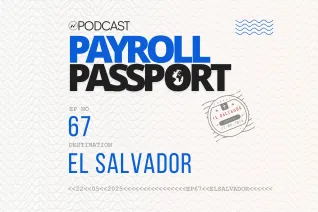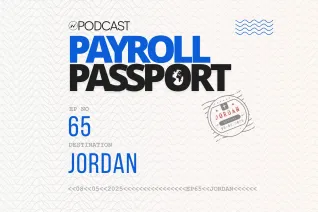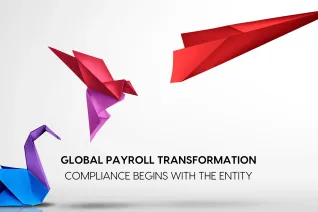Country Spotlight: Payroll in Morocco

Morocco, where the Sahara meets the Atlantic and ancient medinas coexist with growing tech hubs, is emerging as a gateway for international business in North Africa. As global companies expand into the Moroccan market, understanding the country’s payroll system is crucial for ensuring compliance, maintaining employee satisfaction, and achieving sustainable operations.
While the Moroccan government offers tax incentives and regulatory clarity to attract investment, businesses must navigate a complex web of labor laws, mandatory contributions, and evolving tax policies. Let’s explore what it takes to manage payroll in Morocco successfully.
The Foundations of Morocco’s Payroll System
Successfully running payroll in Morocco begins with mandatory registrations and compliance with national labor and tax regulations.
1. Employer and Employee Registration
Before processing payroll, employers must register with the Caisse Nationale de Sécurité Sociale (CNSS). This includes:
- Employer Registration: Submission of required business documents via CNSS or its online platform, DAMANCOM.
- Employee Registration: Every employee must have a unique CNSS number, valid throughout their career.
Additionally, employers must enroll their workforce under Assurance Maladie Obligatoire (AMO)—mandatory health insurance per Article 114 of Law No. 65-00.
2. Income Tax Withholding (Impôt sur le Revenu - IR)
Employers must deduct monthly income tax at progressive rates ranging from 0% to 38%, depending on income brackets and special statuses. They must also:
- File employee IR returns with the local tax office.
- Pay payroll taxes by the 30th of the following month.
Special tax exemptions are available for:
- Employees of new companies (salaries up to MAD 10,000 for the first 2 years).
- Youths under 35 hired on permanent contracts (36-month income tax exemption).
ALSO READ | Morocco: A Guideline to Payroll and Employer of Record

3. Optional Retirement Contributions
Employers may choose to affiliate with the Caisse Interprofessionnelle Marocaine de Retraites (CIMR), a private pension provider. Contributions are shared by both the employer and the employee and must be paid on a quarterly basis.
4. Payroll Processing and Banking
Morocco operates on a monthly payroll cycle. Salary payments can be made through:
- Electronic bank transfers (preferred),
- Checks or postal orders,
- Cash (requires signed receipts from both parties).
Employment Laws and Worker Entitlements
Labor regulations in Morocco aim to strike a balance between the obligations of employers and the rights of workers.
Working Hours and Overtime
- Legal workweek: 44 hours (max 10 hours/day)
- Overtime pay and conditions are governed under Morocco’s Labor Code.
Leave Policies
- Annual leave: Minimum of 1.5 days/month (18 days/year), increasing with tenure.
- Public holidays and maternity/paternity leave are also regulated by the Labor Code.
Minimum Wage (SMIG)
- As of September 2023:
- MAD 16.29/hour or
- MAD 3,111.39/month (industry, trade, services)
Notice Periods
- Vary by tenure:
- < 1 year: 1 month
- 1–5 years: 2 months
- 5 years: 3 months (executives)
Workplace Accident Insurance
Employers are legally required to provide accident du travail (AT) coverage. Compensation is owed for incidents occurring at the workplace or during the commute.
TUNE IN NOW | Payroll Passport Ep 37. Morocco

Payroll Compliance: Reporting & Record-Keeping
- Monthly obligations: Withholding and remitting income tax and CNSS contributions.
- Annual requirement: Submit Etat 9421 (annual payroll return) by the end of February.
- Retention: Maintain payroll records for audit and legal compliance.
Payroll Challenges in Morocco
Despite Morocco’s structured payroll laws, here's a look at the common roadblocks and the best practices to address them:
1. Frequent Legislative Updates
Challenge:
Payroll-related laws, including tax brackets, CNSS contributions, and exemptions, are frequently updated through annual Finance Laws. This makes it difficult for businesses to maintain ongoing compliance without constant monitoring.
Solution:
Adopt a technology-driven payroll platform with built-in regulatory updates. Tools like Neeyamo’s compliance engine auto-sync changes in tax laws and statutory deductions across all countries, reducing the risk of non-compliance or manual errors.
2. Fragmented Registration Systems
Challenge:
Employers must interact with multiple entities such as CNSS, AMO, DAMANCOM, and CIMR, often using different platforms with no centralized dashboard. This leads to inefficiencies and potential data mismatches.
Solution:
Use a centralized payroll solution that consolidates compliance actions and reporting for all authorities. API integration with platforms like DAMANCOM can simplify employee declarations and payment submissions.
3. Optional Pension Complexity
Challenge:
CIMR (the optional pension scheme) offers flexibility, but it creates challenges around budgeting, enrollment, and contribution management, especially when employees are split between mandatory and optional schemes.
Solution:
Establish a clear pension policy with consistent internal guidelines on when and how employees are enrolled in CIMR. Payroll systems should enable custom rule configurations to accommodate varying employee benefit structures.
4. Tax Incentives with Eligibility Conditions
Challenge:
While Morocco offers generous tax exemptions (e.g., for youth employment or startup phase salaries), these benefits require meticulous tracking of employee age, contract type, hiring date, and organizational status.
Solution:
Automate eligibility tracking by setting payroll rule-based flags that alert administrators when an employee qualifies for an exemption or when the benefit period ends. Maintain detailed records for audit readiness and compliance with government reporting requirements.
5. Multi-Country Payroll Coordination (for Global Companies)
Challenge:
Companies operating across multiple countries often face difficulties in integrating Moroccan payroll requirements into a unified global payroll model, especially when Morocco-specific fields, such as CNSS numbers or AMO contributions, are not supported.
Solution:
Implement a global payroll partner with localized expertise in Morocco. Ensure the platform supports both country-specific compliance and global reporting for CFO-level visibility and strategy alignment.
6. Payroll Processing Delays & Errors
Challenge:
Manual payroll workflows often result in delays in payments, incorrect deductions, and employee dissatisfaction, particularly in organizations that lack dedicated payroll personnel.
Solution:
Shift to automated payroll processing with built-in audit trails, salary calculators, and approval workflows. Regular training and compliance audits can further ensure accuracy and confidence in monthly payroll cycles.
Payroll Considerations for Foreign Employers
Foreign employers operating in Morocco must either establish a local entity or partner with an Employer of Record (EOR) to legally hire and pay their employees. All employees—whether local or foreign—must be registered with the CNSS for social security and the AMO for mandatory health insurance, with payroll processed in Moroccan dirhams. Expatriates are generally subject to Moroccan income tax unless covered by a double taxation agreement, and work permits are required for all foreign hires. Employment contracts must be in Arabic or French and submitted to local authorities. Navigating these requirements effectively often requires local payroll expertise or a trusted global payroll partner.
Why choose Neeyamo?
Unlock the power of seamless global payroll management with Neeyamo's expert services tailored for the Moroccan market. As Morocco becomes a strategic hub for international business in North Africa, Neeyamo helps you navigate its complex payroll regulations with ease, ensuring full compliance and minimizing risks across every stage of your expansion.
Not convinced yet? Here's why we're your ideal partner:
Regulatory Roadblocks? Confidently navigate Morocco’s evolving labor and tax laws.
Irritated with Integration? Seamlessly connect your global HR and finance systems.
Chaotic Control? Command your multi-country workforce from a single unified platform.
Tardy Transactions? Ensure prompt, accurate salary disbursements every cycle.
Doubtful Digital Defense? Protect sensitive payroll data with enterprise-grade security.
Neeyamo? Your passport to hassle-free global payroll, now in Morocco and beyond.
Write to us at irene.jones@neeyamo.com to learn how Neeyamo Payroll™ can simplify your payroll operations in Morocco and help you stay future-ready.
Latest Resources
Stay informed with latest updates
If you're curious and have a thirst for knowledge pertaining to the HR, payroll, and EOR universe, don't miss out on subscribing to our resources.















